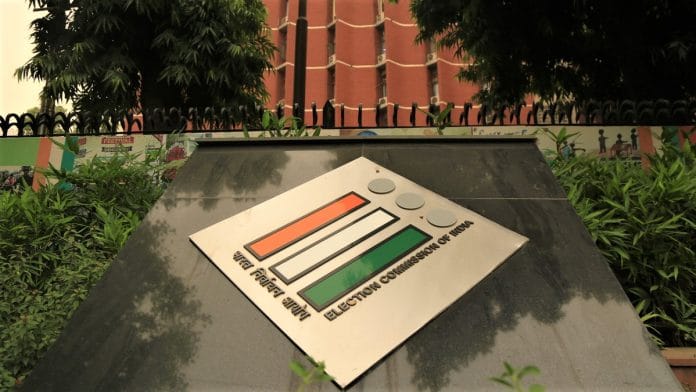New Delhi: The government Thursday introduced a bill in the Rajya Sabha that seeks to negate a March 2023 Supreme Court verdict on the selection of the chief election commissioner (CEC) and other election commissioners (ECs) in the Election Commission.
The Supreme Court said the selection should be made by the President on the advice of a panel headed by the Prime Minister, and comprising the leader of the Opposition in the Lok Sabha and the Chief Justice of India (CJI).
However, the bill — Chief Election Commissioner and other Election Commissioners (Appointment, Conditions of Service and Term of Office) Bill, 2023 — seeks to replace the CJI in the panel with a Cabinet minister to be nominated by the PM, thus giving greater say to the central government.
Amid loud protests from the Opposition benches, Union Law Minister Arjun Singh Meghwal introduced the bill Thursday. The Upper House was adjourned soon after because of the disruption.
Congress general secretary K.C. Venugopal tweeted that the bill was a “blatant attempt at making the Election Commission a total puppet in the hands of the PM”.
“What about the Supreme Court’s existing ruling which requires an impartial panel? Why does the PM feel the need to appoint a biased election commissioner? This is an unconstitutional, arbitrary and unfair bill — we will oppose this on every forum,” he said.
The bill says that if the leader of the Opposition (LoP) in the Lok Sabha has not been recognised as such, then the leader of the largest party in the Opposition in the Lower House shall be deemed the LoP.
Currently, the CEC and election commissioners are appointed by the President on the aid and advice of the Council of Ministers. The judiciary does not have any say in the appointments.
Hearing a writ petition from 2015 that sought an independent mechanism to appoint the CEC and election commissioners, a five-judge Constitution Bench headed by Justice K.M. Joseph had said this March that the founding fathers clearly contemplated a law by Parliament in this respect, and did not intend the executive exclusively calling the shots in the matter of appointments to the Election Commission.
“Seven decades have passed by. Political dispensations of varying hues, which have held the reins of power have not unnaturally introduced a law. A law could not be one to perpetuate what is already permitted namely appointment at the absolute and sole discretion of the executive,” the SC said.
The ruling said that the process of appointment outlined by the Supreme Court will continue to hold until a law is made by Parliament.
The SC’s ruling, however, could not be implemented because no occasion has since arisen.
One of the incumbent election commissioners, Anup Chandra Pandey, is due to retire in February 2023, just ahead of the next Lok Sabha elections.
Also Read: Modi govt and SC are locked in a battle where each wants to set the boundary for the other
Process to appoint, salary and resignation
The bill’s statement of objects and reasons says that it provides for the appointment and qualifications of the candidates, besides a search committee to shortlist names for consideration by the selection committee.
It seeks to replace the Election Commission (Conditions of Service of Election Commissioners and Transaction of Business) Act, 1991, which does not contain provisions regarding the candidates’ qualifications, or the search committee.
The bill states that the CEC and election commissioners shall be persons of integrity, who have knowledge of and experience in management and conduct of elections.
The process to appoint the CEC and election commissioners will start with a search committee headed by the cabinet secretary and comprising two other members not below the rank of secretary to the Government of India.
The committee shall prepare a list of five people, who will then be considered for selection by the PM-chaired committee.
The bill also says that the salary of the CEC and election commissioners shall be the same as those of the cabinet secretary.
The CEC and election commissioners may, at any time, “by writing under his hand addressed to the President”, resign, the bill says.
The CEC and election commissioners shall not be removed except in accordance with the provisions contained in clause (5) of Article 324 of the Constitution, it adds.
It suggests no change in the terms of the CEC and election commissioners, saying they will hold office for a term of six years from the date on which they assumed office or until age 65, whichever is earlier.
The bill also states that the CEC and election commissioners shall not be eligible for re-appointment.
(Edited by Sunanda Ranjan)
Also Read: 4 letters, 1 response — how Modi govt’s tussle with SC on judge appointments played out over 7 yrs






